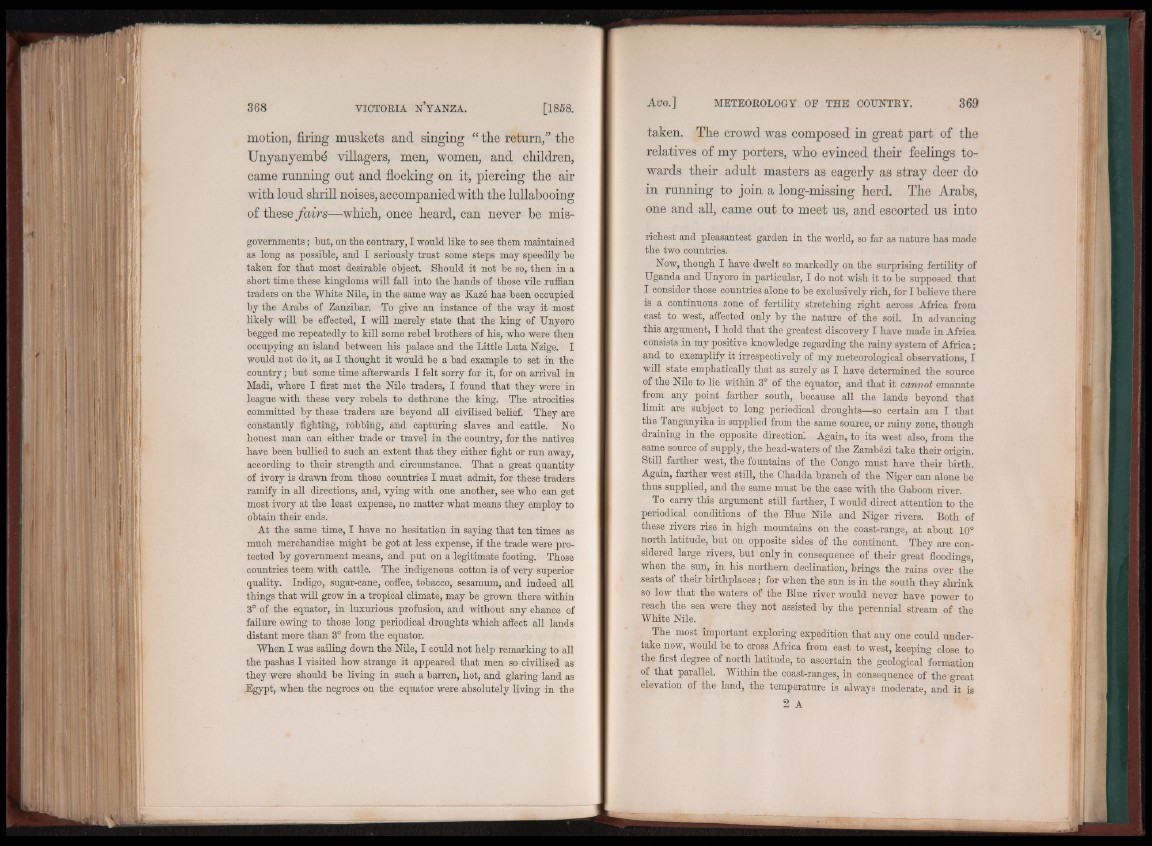
motion, firing muskets and singing “ the return,” the
Unyanyembe villagers, men, women, and children,
came running out and flocking on it, piercing the air
with loud shrill noises, accompanied with the lullabooing
of these fa irs—which, once heard, can never be misgovemments;
but, on the contrary, I would like to see them maintained
as long as possible, and I seriously trust some steps may speedily be
taken for that most desirable object. Should it not be so, then in a
short time these kingdoms will fall into the hands of those vile ruffian
traders on the White Nile, in the same way as Kaze has been occupied
by the Arabs of Zanzibar. To give an instance of the way it most
likely will be effected, I will merely state that the king of Unyoro
begged me repeatedly to kill some rebel brothers of his, who were then
occupying an island between his palace and the Little Luta Nzige. I
would not do it, as I thought it would be a bad example to set in the
country; but some time afterwards I felt sorry for it, for on arrival in
Madi, where I first met the Nile traders, I found that they were in
league with these very rebels to dethrone the king. The atrocities
committed by these traders are beyond all civilised belief. They are
constantly fighting, robbing, and capturing slaves and cattle. No
honest man can either trade or travel in the country, for the natives
have been bullied to such an extent that they either fight or run away,
according to their strength and circumstance. That a great quantity
of ivory is drawn from those countries I must admit, for these traders
ramify in all directions, and, vying with one another, see who can get
most ivory at the least expense, no matter what means they employ to
obtain their ends.
At the same time, I have no hesitation in saying that ten times as
much merchandise might be got at less expense, if the trade were protected
by government means, and put on a legitimate footing. Those
countries teem with cattle. The indigenous cotton is of very superior
quality. Indigo, sugar-cane, coffee, tobacco, sesamum, and indeed all
things that will grow in a tropical climate, may be grown there within
3° of the equator, in luxurious profusion, and without any chance of
failure owing to those long periodical droughts which affect all lands
distant more than 3° from the equator.
When I was sailing down the Nile, I could not help remarking to all
the pashas I visited how strange it appeared that men so civilised as
they were should be living in such a barren, hot, and glaring land as
Egypt, when the negroes on the equator were absolutely living in the
taken. The crowd was composed in great part of the
relatives of my porters, who evinced their feelings towards
their adult masters as eagerly as stray deer do
in running to join a long-missing herd. The Arabs,
one and all, came out to meet us, and escorted us into
richest and pleasantest garden in the world, so far as nature has made
the two countries.
Now, though I have dwelt so markedly on the surprising fertility of
Uganda and Unyoro in particular, I do not wish it to be supposed that
I consider those countries alone to be exclusively rich, for I believe there
is a continuous zone of fertility stretching right across A f r ica, from
east to west, affected only by the nature of the soiL In advancing
this argument, I hold that the greatest discovery I have made in A f r ic a
consists in my positive knowledge regarding the rainy system of Africa;
and to exemplify it irrespectively of my meteorological observations, I
will state emphatically that as surely as I have determined the source
of the Nile to lie within 3° of the equator, and that it cannot emanate
from any point farther south, because all the lands beyond that
limit are subject to long periodical droughts—so certain am I that
the Tanganyika is supplied from the same source, or rainy zone, though
draining in the opposite direction: Again, to its west also, from the
same source of supply, the head-waters of the Zambezi take their origin.
Still farther west, the fountains of the Congo must have their birth.
Again, farther west still, the Chadda branch of the Niger can alone be
thus supplied, and the same must be the case with the Gaboon river.
To carry this argument still farther, I would direct attention to the
periodical conditions of the Blue Nile and Niger rivers. Eoth of
these rivers rise in high mountains on the coast-range, at about 10°
north latitude, but on opposite sides of the continent. They are considered
large rivers, but only in consequence of their great floodings,
when the sun, in his northern declination, brings the rains over the
seats of their birthplaces; for when the sun is in the south they «Vm'nV
so low that the waters of the Blue river would never have power to
reach the sea were they not assisted by the perennial stream of the
White Nile.
The most important exploring expedition th a t any one could undertake
now, would be to cross Africa from east to west, keeping close to
the first degree of north latitude, to ascertain the geological formation
of that parallel. Within the coast-ranges, in consequence of the great
elevation of the land, the temperature is always moderate, and it is
2 A